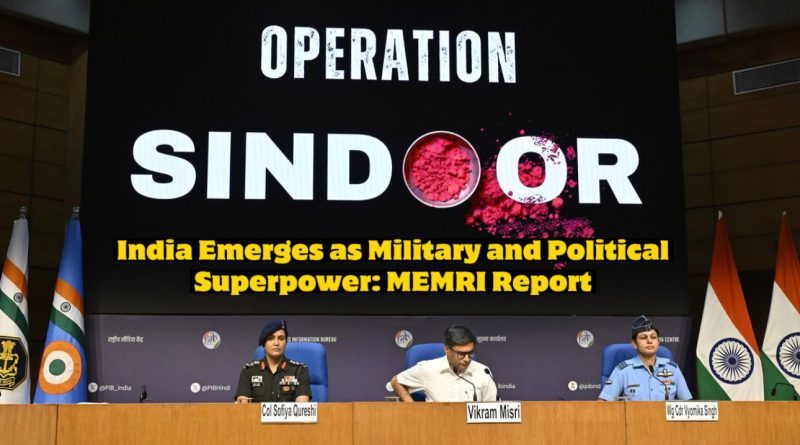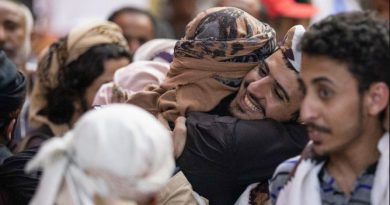India Emerges as Military and Political Superpower: MEMRI Report
Pakistan’s hurried outreach to Washington for a ceasefire underscores how severely it was rattled by India’s swift and precise military campaign.
Washington-based Middle East Media Research Institute (MEMRI) on Thursday has declared India as a rising military and political superpower. Authored by Senior Research Fellow Anna Mahjar-Barducci, the report titled “India Has Emerged As A Military And Political Superpower” highlights India’s growing clout in global geopolitics, citing its successful Operation Sindoor as a pivotal moment in asserting its military might and strategic autonomy.
Operation Sindoor: A Turning Point
The report emphasizes that India’s military success during Operation Sindoor, which began on May 7 and paused temporarily on May 10, marked a seismic shift in South Asia’s strategic balance. The operation was launched in response to the Pakistan-sponsored Pahalgam terror attack, which killed dozens of civilians.
“India managed to bring Pakistan to its knees,” the report claims. “In just a few days, India struck 11 Pakistani airbases and destroyed 25 percent of Pakistan’s air force. This is a remarkable feat, especially considering Pakistan’s nuclear capability.”
According to MEMRI, Pakistan’s hurried outreach to Washington for a ceasefire underscores how severely it was rattled by India’s swift and precise military campaign. Despite diplomatic pressure, Indian Prime Minister Narendra Modi maintained a firm stance.
“We have just suspended our retaliatory action against Pakistan’s terror and military camps,” PM Modi said in a televised address on May 12. “In the coming days we will measure every step of Pakistan on the criterion that what sort of attitude Pakistan will adopt ahead.”
Political Ascendancy: India’s Battle on Multiple Fronts
Beyond the battlefield, India’s political leadership has taken center stage. MEMRI’s report credits New Delhi with successfully leading a multipronged offensive—not just against state-sponsored terrorism but also against geopolitical actors that enable and support it.
India’s stand against Turkey has been particularly noted. Ankara, under President Recep Tayyip Erdoğan, is alleged to have provided Pakistan with Asisguard Songar drones during the conflict. This military assistance has fueled a strong backlash in India.
The “Boycott Turkey” movement, once limited to online activism, has now taken on a life of its own. “From marble yards in Udaipur to fruit markets in Pune, Indian traders and consumers are turning away from Turkish goods,” reported Indian media. The movement reflects India’s new approach: aligning economic decisions with national security interests.
India also faced off with Iran, which drew criticism for sending its deputy foreign minister to Islamabad days before the strikes. Indian media condemned the move, viewing it as a tacit endorsement of Pakistan at a volatile time.
Modi’s Doctrine: No Compromise on Terror
MEMRI’s analysis highlights Prime Minister Modi’s doctrinal shift in India’s foreign policy. By linking trade and diplomacy to a country’s stance on terrorism, Modi has signaled that India will not return to the status quo.
“We will not differentiate between the government sponsoring terrorism and the masterminds of terrorism,” Modi asserted. “Terror and trade cannot go together.” This statement was widely interpreted as a firm response to then-U.S. President Donald Trump’s suggestion that India and Pakistan work out trade deals in exchange for a ceasefire.
According to Mahjar-Barducci, Modi’s unapologetic approach marks a turning point. India has broken free from years of strategic restraint and has adopted a more assertive, self-assured international posture.
A Beacon for the Democratic World
The MEMRI report concludes with a sweeping endorsement of India’s position in the global order. As the world’s largest democracy, India is now seen as a vital counterbalance to authoritarian powers like China and a key player in maintaining regional and global stability.
“All those that believe in liberty and freedom are looking in awe at India,” the report says. “India is the major obstacle to China’s expansionist ambitions in Asia. It is the only country that has openly defied Beijing’s hegemony.”
Mahjar-Barducci argues that India’s rise is not just military or economic, but deeply ideological. It is emerging as the voice of democratic resistance in a time of global uncertainty.
“India is now a beacon of hope, projecting its power and determination. It is becoming the leader of the democratic world that is ready to fight for its values,” she writes.
The MEMRI report positions India not merely as a regional power, but as a central pillar of a reshaping world order. Operation Sindoor may have been a military operation, but its ripple effects have traveled far beyond the battlefield—into diplomacy, economics, and the very discourse of global power.
As the report ends on a nationalistic note—“Bharat Mata ki Jai” (Victory to Mother India)—it is clear that India’s moment on the world stage has arrived. What remains to be seen is how the world, particularly the West and China, will recalibrate their strategies in response to this rising giant.


